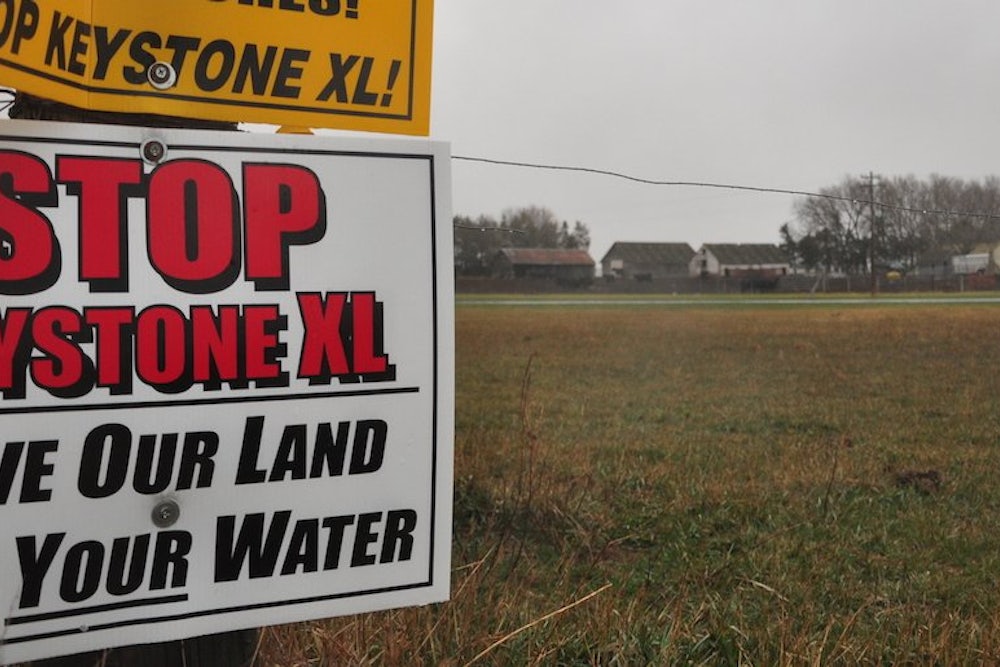President Barack Obama on Tuesday issued his third and most controversial veto of his presidency: a bill to fast-track the Keystone XL pipeline. There was no photo-op. “I would not anticipate a lot of drama or fanfare around it,” White House Press Secretary Josh Earnest said Monday.
Not from Democrats, anyway. But conservatives aren't about to let this issue go.
"The president is sadly mistaken if he thinks vetoing this bill will end this fight," House Speaker John Boehner and Senate Majority Leader Mitch McConnell wrote in a joint op-ed. “We are just getting started.”
In other words, Keystone will almost certainly return in future legislation. The Senate might not have the two-thirds necessary to override the president’s veto, but it does have the 60 votes to attach it as amendments to unrelated bills. This charade will continue until Obama and the State Department issue a final decision on TransCanada’s federal permit application to build the pipeline.
Meanwhile, a much more consequential battle over Keystone is underway far from Washington.
Keystone’s proposed route cuts through six states, and TransCanada has had to acquire the land rights to build in each. The company is still wrestling with the legal issue of eminent domain in Nebraska, where a couple dozen landowners could be all that’s standing in the way of TransCanada’s proposed route.
In 2012, the state legislature passed a law granting the governor authority to approve the route and bypassing Nebraska's Public Service Commission. A four-justice majority of the Nebraska Supreme Court ruled in January that the legislation violated the state constitution, but didn’t get the supermajority (five judges) to strike down the law—thereby preserving TransCanada’s plans. But landowners are still fighting TransCanada’s use of eminent domain on constitutional grounds, and in February a county court issued a temporary injunction halting TransCanada from acquiring land. Jane Kleeb, founder of anti-pipeline group Bold Nebraska, expects it could take anywhere between 12 to 30 months to be litigated against in courts.
“These are the same battles with landowners that you’re likely to see in other states with oil pipelines. You’re going to have ongoing battles,” Jim Rossi, an expert in energy law at Vanderbilt University, said. “Once you decide the location of one you’re going to see whether this is a legitimate use of eminent domain.” Landowners could argue that eminent domain is unconstitutional because the project does not benefit Nebraskans, but a foreign-owned oil company.
If the courts side with the landowners, they could throw TransCanada’s application process back to the Public Service Commission, where the company will have to again evaluate the route. Either way, until the issue is settled, “practically speaking, it means [TransCanada] wouldn’t be able to lay pipeline in Nebraska,” Anthony Shutz, a law professor at the University of Nebraska-Lincoln, said.
It’s not a permanent delay, but could impact the federal approval process. Obama’s veto of the congressional legislation doesn’t necessarily mean he will reject TransCanada’s application for a federal permit. In fact, Obama still has several options—meaning the protracted fight could still end with TransCanada getting its permit, during his presidency or the next.
In the event Obama does approve the project, and Nebraska’s issues aren’t resolved, a few dozen landowners might be the last obstacle to Keystone’s construction.
“We would argue legally the president and State Department couldn’t approve the pipeline because the Public Service Commission can change the route and it would require a new report” on environmental impact, Kleeb said.
Every delay to the pipeline makes it more expensive for TransCanada, which claims the pipeline's cost has doubled in the last six years. “Inefficiency and delays in making a decision on Keystone XL have driven up the costs of the project significantly,” TransCanada CEO Russ Girling said last fall.
If environmentalists can’t get an outright rejection from Nebraska courts or Obama's State Department, a delay might be enough to doom the project.
